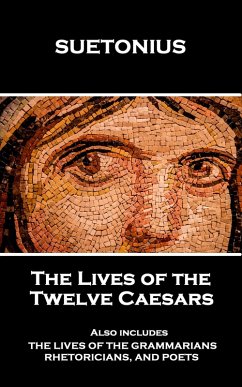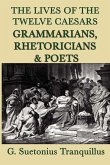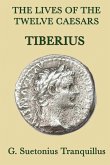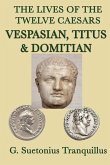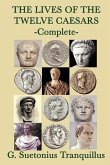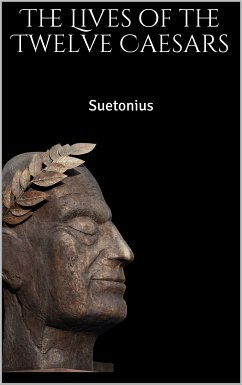And also includes THE LIVES OF THE GRAMMARIANS, RHETORICIANS, AND POETS.
Translated by Alexander Thomson, M.D. and revised and corrected by T. Forester, Esq., A.M.
Gaius Suetonius Tranquillus is more commonly known as Suetonius. He was born around 69 AD. A certain date is not available and this date is based on his own remark that he was a young man some twenty years after the death of Emperor Nero. Various accounts exist as to his place of birth but most now lean towards Hippo Regius, a small north African town in Numidia, in modern-day Algeria.
His family were respected and of a good social position and standing. His father, Suetonius Laetus, was a tribune of equestrian rank (tribunus angusticlavius) in the 13th Legion. As was common with many priviledged families his education was of a classical nature and at the various schools of rhetoric in Rome.
Suetonius was a close friend of senator and letter-writer Pliny the Younger. He describes Suetonius as 'quiet and studious, a man dedicated to writing.' With Pliny's help he manged to buy a property. Pliny was also able to obtain on his behalf immunities usually granted to a father of three, the ius trium liberorum, even though his marriage was childless. Pliny was also instrumental in establishing the foundations of an on-going relationship with both the Emperor Trajan and later Hadrian.
It is thought that Suetonius may have served on Pliny's staff during the time Pliny was Pro-Consul of Bithynia Pontus (now northern Asia Minor) between 110 and 112 AD.
Under the Emperor Trajan Suetonius was to serve as secretary of studies and as a director of Imperial archives.
When Hadrian became Emperor he was appointed as his secretary. However this was to unravel when he was dismaissed by Hadrian for excessive informality with the empress Sabina.
Suetonius wrote much about the daily life of Rome, its citizerns and its elite. Much of his work has not survived but importantly his biography of the 12 Caesars has. Covering a dozen successive rulers from Julius Caesar to Domitian, in Latin, it is entitled 'De Vita Caesarum'. Amongst its details are the first accounts of Julius Caesar's epilepsy. The book adheres to a set formula for the telling of each Emperor's life; a description of appearance, omens, family history, quotes, and then a history of each Caesar's reign.
His other works span many avenues of exploration and recording especially the daily life of Rome, politics, oratory, and the lives of writers, poets, historians, and grammarians.
Translated by Alexander Thomson, M.D. and revised and corrected by T. Forester, Esq., A.M.
Gaius Suetonius Tranquillus is more commonly known as Suetonius. He was born around 69 AD. A certain date is not available and this date is based on his own remark that he was a young man some twenty years after the death of Emperor Nero. Various accounts exist as to his place of birth but most now lean towards Hippo Regius, a small north African town in Numidia, in modern-day Algeria.
His family were respected and of a good social position and standing. His father, Suetonius Laetus, was a tribune of equestrian rank (tribunus angusticlavius) in the 13th Legion. As was common with many priviledged families his education was of a classical nature and at the various schools of rhetoric in Rome.
Suetonius was a close friend of senator and letter-writer Pliny the Younger. He describes Suetonius as 'quiet and studious, a man dedicated to writing.' With Pliny's help he manged to buy a property. Pliny was also able to obtain on his behalf immunities usually granted to a father of three, the ius trium liberorum, even though his marriage was childless. Pliny was also instrumental in establishing the foundations of an on-going relationship with both the Emperor Trajan and later Hadrian.
It is thought that Suetonius may have served on Pliny's staff during the time Pliny was Pro-Consul of Bithynia Pontus (now northern Asia Minor) between 110 and 112 AD.
Under the Emperor Trajan Suetonius was to serve as secretary of studies and as a director of Imperial archives.
When Hadrian became Emperor he was appointed as his secretary. However this was to unravel when he was dismaissed by Hadrian for excessive informality with the empress Sabina.
Suetonius wrote much about the daily life of Rome, its citizerns and its elite. Much of his work has not survived but importantly his biography of the 12 Caesars has. Covering a dozen successive rulers from Julius Caesar to Domitian, in Latin, it is entitled 'De Vita Caesarum'. Amongst its details are the first accounts of Julius Caesar's epilepsy. The book adheres to a set formula for the telling of each Emperor's life; a description of appearance, omens, family history, quotes, and then a history of each Caesar's reign.
His other works span many avenues of exploration and recording especially the daily life of Rome, politics, oratory, and the lives of writers, poets, historians, and grammarians.
Dieser Download kann aus rechtlichen Gründen nur mit Rechnungsadresse in D ausgeliefert werden.

